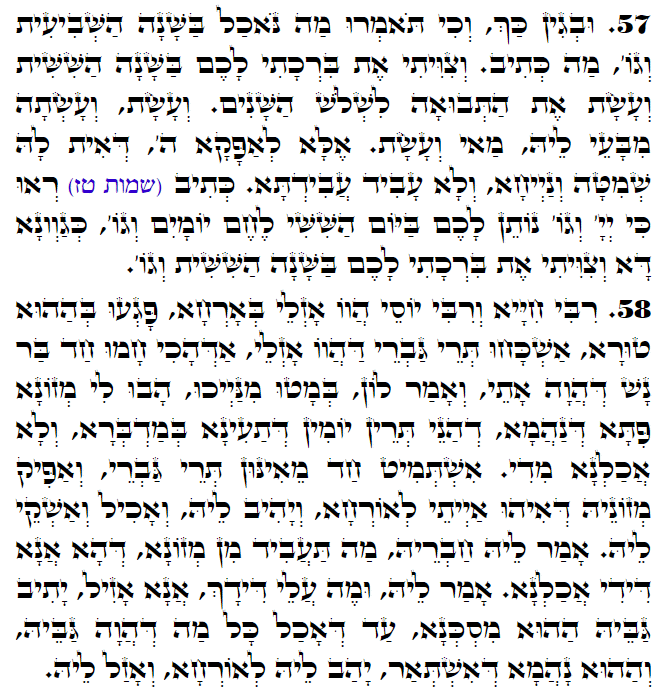Daily Zohar # 3039 – Behar – What are the hands of God?
Daily Zohar 3039
Daily Zohar 3039

.
Hebrew translation:
58. רַבִּי חִיָּיא וְרַבִּי יוֹסֵי הָיוּ הוֹלְכִים בַּדֶּרֶךְ, פָּגְעוּ בְּאוֹתוֹ הַר, מָצְאוּ שְׁנֵי גְבָרִים שֶׁהָיוּ הוֹלְכִים. בֵּין כָּךְ רָאוּ אִישׁ אֶחָד שֶׁהָיָה בָּא, וְאָמַר לָהֶם: בְּבַקָּשָׁה מִכֶּם, תְּנוּ לִי מְזוֹן פַּת לֶחֶם, שֶׁשְּׁנֵי יָמִים אֵלֶּה שֶׁתָּעִיתִי בַמִּדְבָּר וְלֹא אָכַלְתִּי דָבָר. נִשְׁמַט אֶחָד מֵאוֹתָם שְׁנֵי גְבָרִים, וְהוֹצִיא מְזוֹנוֹ שֶׁהוּא הֵבִיא לַדֶּרֶךְ, וְנָתַן לוֹ וְהֶאֱכִיל וְהִשְׁקָה אוֹתוֹ. אָמַר לוֹ חֲבֵרוֹ: מַה תַּעֲשֶׂה עִם הַמָּזוֹן, שֶׁהֲרֵי אֲנִי אֶת שֶׁלִּי אֲנִי אוֹכֵל? אָמַר לוֹ: וּמָה עַל שֶׁלְּךָ אֲנִי הוֹלֵךְ? יָשַׁב אֶצְלוֹ אוֹתוֹ עָנִי, עַד שֶׁאָכַל כָּל מַה שֶּׁהָיָה אֶצְלוֹ, וְאוֹתוֹ לֶחֶם שֶׁנִּשְׁאַר נָתַן לוֹ לַדֶּרֶךְ, וְהָלַךְ לוֹ.
.
Zohar Behar
#57
Leviticus 25:21
“וְצִוִּיתִי אֶת בִּרְכָתִי לָכֶם בַּשָּׁנָה הַשִּׁשִּׁית וְעָשָׂת אֶת הַתְּבוּאָה לִשְׁלֹשׁ הַשָּׁנִים.”
“then I will so order My blessing for you in the sixth year that it will bring forth the crop for three years.”
The correct way to write the word ‘וְעָשָׂת,’ ‘it will bring’ is ‘וְעָשְׂתָה.’ The letter ה is missing in the verse above and the Zohar explains that the ה is the seventh, Malchut, and the seventh is a Sabbatical year and the aspect of rest and receiving Light. The blessings come on the sixth that is Yessod as it is said;
Exodus 16:29
“רְאוּ, כִּי-יְהוָה נָתַן לָכֶם הַשַּׁבָּת–עַל-כֵּן הוּא נֹתֵן לָכֶם בַּיּוֹם הַשִּׁשִּׁי, לֶחֶם יוֹמָיִם; שְׁבוּ אִישׁ תַּחְתָּיו, אַל-יֵצֵא אִישׁ מִמְּקֹמוֹ–בַּיּוֹם הַשְּׁבִיעִי”
“See, YHVH has given you the sabbath; therefore, He gives you bread for two days on the sixth day. Remain every man in his place; let no man go out of his place on the seventh day.”
#58
Rabbi Chiya and Rabbi Yosei were walking and arrived at a mountain. They saw two people walking on the way. Another person came to them and asked for some food, a piece of bread. He told them that he got lost in the desert and his mind is weak because he didn’t eat for two days. One of the people took out his food to give the poor person. The other person turns to his friend saying; what would you do without food? I am not sharing my food with you! His friend answered with a question; am I relying on you for food to live? Then he sat with the poor man, that ate all the food he had with him and left.
Lesson;
Lesson;
God gave us the Manna from heaven during the journeys in the wilderness to the Promised Land. Moses instructed the people to take portions of Manna that they need for their household and for one day. Those who took more and tried to save for the next day saw that the Manna turned bad in the following morning. Only on Friday, they received double portions, and the Manna stayed fresh on the next morning that was Shabbat, the seventh day.
Psalms 145:16
“פּוֹתֵחַ אֶת יָדֶךָ וּמַשְׂבִּיעַ לְכָל חַי רָצוֹן.”
“You open Your hand And satisfy the desire of every living thing.”
God provides the sustenance for all his creation. In this world, we serve him by following his wills and laws of teh Torah that tells us to help everyone in need. In the portion of Kedoshim we learn the precept of “Love your fellow man like yourself,” and it means as Rabbi Ashlag explains that even if you have one bed at home to sleep, you give it to the other person and you sleep on the floor. The other people around us and we are the aspects of the hands of God. He gives us so we can give others and when we do so, he makes us greater channels, giving us more to do more.
If we try to grab from this world more than our vessel fit to receive and to share, negative energy comes and spoils what we have. We can have more if we expand our channel by giving.
The Zohar story continues in the next DZ with more lessons to learn.
{||}

 Previous: Behar
Previous: Behar

